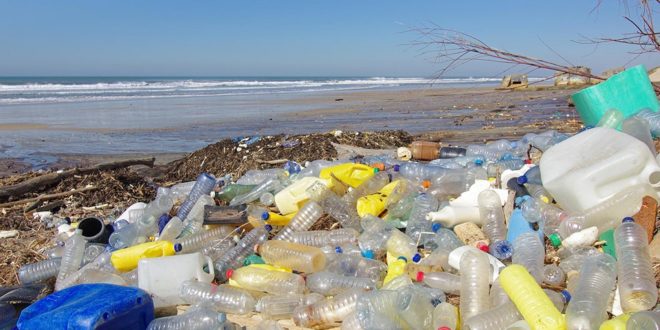Climate Change & Energy
FoN: An Open Letter To The Plastic Producers In Ghana
Source: ghenvironment.com - July 3, 2022

File Photo
Single-use plastic products (SUPPs) may epitomize convenience, but with the damage they cause through production, distribution and litter, they are a major threat to environmental and human health.
The open burning of plastic waste, consumption of plastic-contaminated seafood and creation of harmful microplastics are just some reasons why SUPPs should be phased out.
Eliminating plastic product pollution is an important component of the United Nations Decade on Ecosystem Restoration.
The UN Environment Programme’s (UNEP’s) recent report From Pollution to Solution shows there is currently between 75-199 million tons of plastic waste in the ocean, and in 2016 some 9-14 tons of waste entered the aquatic ecosystem. It is estimated that by 2040, this will have almost tripled to 23-37 million tons per year. Plastics are the largest, most harmful and most persistent of marine litter, accounting for at least 85 per cent of all marine waste.
It rained in many parts of Ghana in the month of June and the picture of the floods from the aftermath is one that no longer surprises many citizens. In the twin-city of Sekondi Takoradi, Accra and Kumasi, many streets got flooded and some streets/roads were rendered unusable.
In the gushing flash floods were thousands, if not millions of single-use plastics produced by Coca-Cola, Unilever, and Nestle among others.
The level of plastics in many cities across Ghana, majestically displayed during downpours in many drainage systems across the streets, are life-threatening and demands urgent action.
Plastic production is set to rise by 40% over the next decade, driven in large part by single-use plastic packaging. The impact it’s having on the oceans, terrestrial environment, wildlife, and human health is devastating.
So how can we phase out SUPPs and what are the alternatives?
Here are some recommendations from Friends of the Nation (FoN) a socio-environmental advocacy NGO, based in Sekondi-Takoradi in the Western Region of Ghana on SUPPs:
Read the full open letter below
OPEN LETTER TO PLASTIC PRODUCERS
It rained in many parts of Ghana , June 15 2022 for well over 12 hours. The picture of the floods from the aftermath is one that no longer surprises many citizens. In the twin-city of Sekondi Takoradi, many streets got flooded and some streets/roads were rendered unusable.
In the gushing flash floods were thousands, if not millions of single-use plastics produced by Coca-Cola, Unilever, and Nestle among others.
The level of plastics in many cities across Ghana, majestically displayed during downpours in many drainage systems across the streets, are life-threatening and demands urgent action.
Plastic production is set to rise by 40% over the next decade, driven in large part by single-use plastic packaging. The impact it’s having on the oceans, terrestrial environment, wildlife, and human health is devastating.
In the light of this and in commemoration of the World Refill Day (June 16, 2022), Friends of the Nation is seeking as a matter of utmost priority, greater commitments from Oil-producing companies in Ghana whose by-products are used for the manufacturing of plastics, Unilever, Nestle, Coca Cola, Pepsi Cola, bottled and sachet water producers, etc., to desist from producing single-use plastics to reusable plastics and enhanced recovery systems of plastics from the environment.
Friends of the Nation therefore urges you to become environmentally responsible in tackling the plastic crisis by committing to the following environmentally friendly principles:
REVEAL the full extent of your plastic footprint honestly if you do not already do so. This is a core part of accountability.
REDUCE the amount of plastic you use by setting ambitious, transparent plastic reusable targets and commit to achieving them.
REINVENT your packaging to ensure they are refillable and reusable by design. To do this, you should commit to collaborating with other companies to standardize reusable packaging and build shared reuse systems and infrastructure.
It’s time your corporations redress this by investing in non-toxic reusable methods of delivering products that are affordable and accessible for all. At the same time, to stop relying on burning technologies for disposing of packaging materials that are already on the market.
By focusing on reducing the use and demand for plastic packaging and centering reuse and refill at the heart of your response, you will be illustrating a true commitment to effectively tackling the plastic driven ecological crisis that we face, and an acknowledgement of your role within this crisis.
Remember that as you enjoy the profits from your work, someone in a city in Ghana has had to die from flooding, aided by single-used plastics. As you enjoy your profits, notice that not all countries are developed enough to control the spread and effects from the plastics you produced.
We at Friends of the Nation believe that plastics must be kept in business and out of the environment. We look forward to companies transitioning to a new plastic refill and reusable age.
For Humanity,
MEVUTA Donkris
Friends of the Nation
(Executive Director)
Amenyo Quashigah
July 4, 2022
 File Photo
File Photo

 File Photo
File Photo
Amenyo Quashigah
July 4, 2022